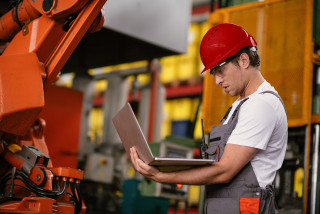Buy or lease equipment.
Whether you're an established business looking to expand or a new firm searching for the best possible start, choosing between buying or leasing new equipment is one of the biggest financial decisions you'll make.
Your options.
There's no definitive answer to which is best - both purchasing and leasing equipment can be beneficial to your business. A new business with very little starting capital may choose to lease to cut down on start-up costs. An expanding business with a reliable client base may choose to purchase, safe in the knowledge that the cost will be funded by their stable cash flow.
What to consider.
Before deciding whether to buy or lease, it's sensible to take a few important factors into account.
- How long will you need the equipment for? Is it for a short-term project or do you plan to make good use of it?
- Is it cost effective? Will the extra business you make cover the expense of leasing or purchasing?
- Will the equipment become outdated in the near future? Signing a three-year lease on a machine that will be obsolete in a year doesn't make sense
- What are your current financial priorities? Are there other purchases that should be made first?
Now that you've clearly set out your needs as a business in relation to your new equipment, it's time to become familiar with the benefits of buying and leasing.
Choosing to buy.
Buying enables you to build equity through your equipment, but purchasing your equipment outright is inconceivable to a business with a limited budget.
Start-ups and expanding companies both work hard to preserve their capital. This is why many businesses will secure loans to cover the cost of new equipment and maintain their financial flexibility.
So whatever your company's financial circumstances, purchasing can still remain a feasible option.
The pros of purchasing
Ownership of equipment that's unlikely to become technologically obsolete is one of the most obvious advantages of purchasing. For example, office furniture, company vehicles, and farm machinery are likely to retain their value for quite some time after their initial purchase.
This means that further down the line when your equipment needs to be replaced, it might be possible to trade it in for a fair return.
Depreciation of company assets is a tax break that's often overlooked by new businesses. The reduced value of your business equipment allows a deduction against income over the period of its use.
Once the whole cost of your asset is written off, you're no longer entitled to deductions. Inland Revenue's website has a handy depreciation guide that explains the process in full.
You can also make use of their depreciation rate finder to calculate the current value of your equipment for tax purposes.
Purchasing your own equipment can be a cheaper option in the long run. For example, if a printer that cost $5,000 is leased at a monthly rate of $200 over 3 years, once the lease period is up, you have paid $7,200. All this for a machine that you don't even own.
If a business can't afford such a large outlay, a fixed rate loan is a more viable option.
If you feel that purchasing might be the right approach for your small business, then check out Westpac's equipment finance service1 to help choose the right finance package for your needs.
Understanding how leasing works.
When you lease a piece of equipment, you're simply renting it for a set period of time. The leasing company retains ownership of the equipment while your business has the exclusive use of it for the term of the lease.
A lease will typically run for anything between 24 and 60 months. Once the agreement is entered into, both parties are obligated to see out the term of the lease.
Before agreeing to a lease agreement, it's a good idea to understand exactly how the lease will affect your business.
The pros of leasing
- Lower initial cost. This is the main advantage for most businesses as leasing agreements generally don't require a down payment. You can acquire brand new equipment at a very low cost
- Lease payments are tax deductible as business expenses. These expenses are considered paid from pre-tax earnings and in certain cases are fully deductible
- A lease offers more flexibility. Leases are usually easier to obtain than business loans and payments can often be structured to suit your needs. It's also worth bearing in mind that if your company has a bad credit rating, leasing can offer a better chance of acquiring equipment than financing
- Leasing allows you to upgrade your equipment at the end of each term without the need for further investment. When buying equipment, once the warranty has expired, bills for repairs can start to mount up. Purchasing a newer model might be an expense the company can't afford.
A decision this important can only be made on a case-by-case basis. With each business having its own specific needs, some expert advice will be a great help.

Equipment finance.
Buy the vehicles, machinery or equipment your business needs now, without tying up your working capital.
Things you should know.
1 Eligibility criteria and lending criteria, terms and conditions apply. An establishment fee may apply.
The material on this webpage is provided for information purposes only and is not a recommendation or opinion. We recommend you seek independent legal, financial and/or tax advice.
Links to other sites are provided for convenience only and Westpac accepts no responsibility for the availability or content of such websites.
